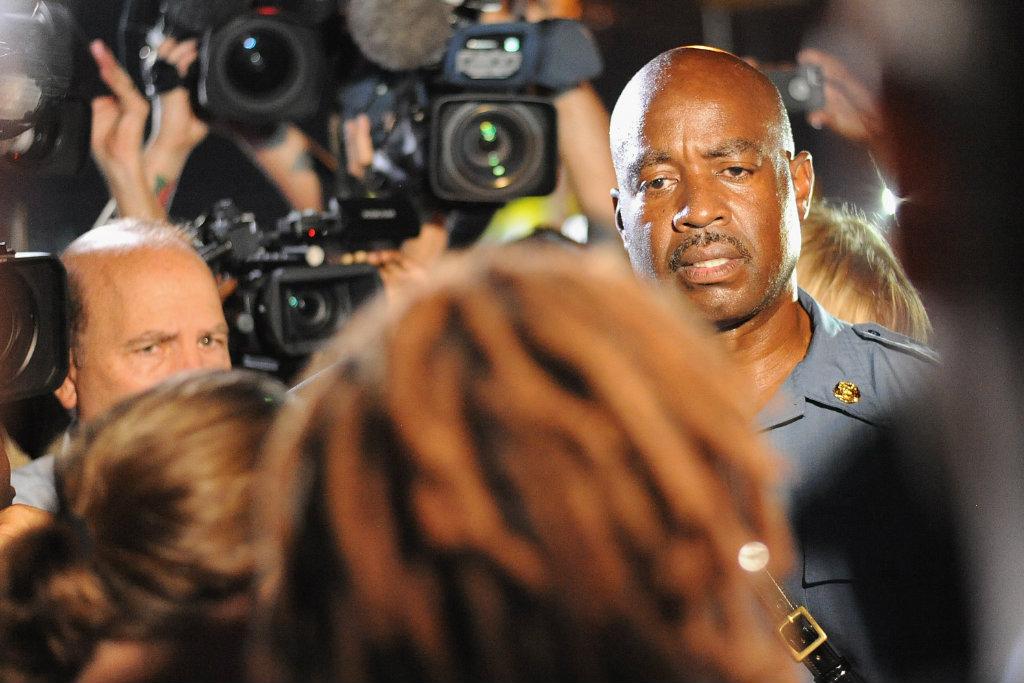Ferguson case reveals US media’s flaws in covering issues of race
Captain Ron Johnson of the Missouri Highway Patrol speaks to media during a protest on West Florissant Avenue in Ferguson, Mo. on Aug. 18, 2014. The media has since provided near-nonstop coverage of the events that unfolded.
Even before a grand jury decided not to indict Officer Darren Wilson for shooting black teenager Michael Brown, the events in Ferguson, Mo. dominated news reports, explainers, analyses and commentaries in mainstream media, tabloids and independent blogs alike.
“As far as the Ferguson case is concerned, [the media] covered pretty much everything you can cover,” said Clint Wilson, professor emeritus of communication, culture and media studies at Howard University in Washington, DC.
The problem, Wilson said, is that the same is rarely true for the issue of race in general. The cases of Brown and of Eric Garner – a black man who died in a chokehold by a white Staten Island police officer in July – are examples of the media’s sporadic coverage and lack of leadership when it comes to tackling racial relations in the United States, Wilson said.
In a case with striking similarities to Brown's, the officer who killed Garner, Daniel Pantaleo, learned on Wednesday that a grand jury had decided not to indict him for Garner's death.
“The role of mainstream media should be to go beyond this episodic coverage, to really take a hard look so that the public understands this is not an isolated incident,” he said. Wilson added that progress in covering issues of race has been limited to “baby steps” that revolve around momentarily hot issues.
Real growth means that every racially-charged story – not just those that grab headlines or generate hashtags – is put into context, scrutinized for bias and examined in as many perspectives as possible, said Hemant Shah, director of the School of Journalism and Communication and a professor of mass media, race and ethnicity at the University of Wisconsin-Madison.
“We have to do multilayered reporting on a much more consistent basis,” Shah said, “not just when Michael Brown was shot or Trayvon Martin was shot.”
Journalism's burden
The media’s responsibility to provide comprehensive coverage is vital, especially today when social media and the internet have given the public more control over the news they consume, said Bob Steele, a retired media ethicist who taught at DePauw University in Indiana and The Poynter Institute for Media Studies in Tampa, Fla.
Increasingly, individuals can limit their news consumption to content that validates instead of challenges their own beliefs.
Such behavior, Steele said, “feeds our own ideological beliefs and in some cases, feeds stereotypes and bigotry" – an obstacle to the progress and learning that good journalism is supposed to cultivate.
Part of the responsibility rests with the public to seek out multiple and diverse sources of information, Steele said. But a great deal of it rests with the media, he noted, which should be at the forefront of discussions toward improving issues like race relations.
“We need to step back with a fair, critical eye to find out where we fall short,” Steele said.
Commitment issues
The first step towards progress is commitment. Editors and reporters alike have to financially – and emotionally – commit to self-awareness when covering racial issues, Steele said.
That means being accurate and balanced in the language used to describe events, he said.
It also means examining obvious and expected story arcs for flaws, said Shah. In the case of Ferguson, media outlets reinforced the original news reports of the shooting and the verdict with analysis, commentary and a questioning of existing angles and facts.
“That kind of reporting should be done all year round,” Shah said. “That’s where we ought to be moving.”
Diversifying newsrooms – hiring people of all colors, cultures, ages, genders and socio-economic backgrounds – is another important step, Steele said. The demographics of journalism have not kept pace with the increasingly diverse demographics of the American public, which means that newsrooms are not doing a good job representing the perspectives of their audience. An older white male, Steele said, is less likely to understand the forms of expression of a a younger African-American or Latino than someone from a similar ethnic background.
Ultimately, said Howard University’s Wilson, it’s about the media industry taking the lead in embracing growing diversity. It’s about news executives accepting change as an opportunity to grow and improve their businesses, instead of as a sign to close ranks. It's about editors and reporters challenging themselves to take a stand for what's right instead of what's merely objective.
It's about journalism taking the lead in the struggle for equality instead of being part of the problem, Wilson said.
“Better news reporting on race issues will be the outcome when the whole industry embraces better reporting, period," Shah said.
Every day, reporters and producers at The World are hard at work bringing you human-centered news from across the globe. But we can’t do it without you. We need your support to ensure we can continue this work for another year.
Make a gift today, and you’ll help us unlock a matching gift of $67,000!
